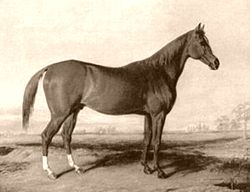Boston (horse)
| Boston | |
|---|---|
|
Boston, from the painting by Edward Troye
|
|
| Sire | Timoleon |
| Grandsire | Sir Archy |
| Dam | Sister to Tuckahoe |
| Damsire | Ball’s Florizel |
| Sex | Stallion |
| Foaled | 1833 |
| Country | United States |
| Colour | Chestnut |
| Breeder | John Wickham |
| Owner | Nathaniel Rives, 2. Col. William R. Johnson & James Long |
| Trainer | Capt. John Blecher 2. Arthur Taylor |
| Record | 45: 40-2-1 |
| Earnings | $51,700 |
| Awards | |
| 1955 Hall of Fame inductee | |
| Last updated on 10 September 2010 | |
Boston (1833–1850) was an outstanding Thoroughbred racehorse and a Leading sire in North America three times from 1851 to 1853. He started in about 45 races, winning 40, including 15 in succession. Boston was later one of the initial inductees into the Hall of Fame.
He was a chestnut stallion with a white blaze on his nose, and he was foaled in Richmond, Virginia. Boston was bred by Virginia attorney John Wickham (who had been Aaron Burr's counsel in his trial for treason). He was by the very good racehorse Timoleon (by the great Sir Archy); his dam was named Sister to Tuckahoe, by Ball's Florizel. Boston was inbred to Diomed in the third generation (3m x 3f). He was a half-brother to the Shylock mare who founded a successful family. They were from the number 40 family, which traced back to the imported mare Kitty Fisher.
As a two-year-old, Boston was lost by his breeder in a card game and was given to Wickham's friend Nathaniel Rives of Richmond to repay his debt of $800. He was named after a popular card game and later given the nickname of "Old Whitenose". Boston had a wilful temperament and was difficult to train. He was sent to the stable of John Belcher, and then to the trainer L. White, and then back to Belcher. White said, "The horse should either be castrated or shot—preferably the latter."
On April 20, 1836, he was entered into a match in Richmond against a colt of White's. Boston ran away with the race, gaining a long lead, only to stop and sulk.
Back under saddle, Boston won fifteen races in succession. From Georgia to New York, he raced until he was a ten-year-old, winning 40 of his 45 starts. In those days, races weren't stakes, graded or otherwise, and they weren't run on specially prepared racecourses. They were heats across open country and 30 of Boston's victories were in these four-miles heats, while another 9 wins were in three-mile heats. Boston had established himself as a great—if tempestuous—race horse and more than once, his then owner (Colonel W. R. Johnson, called the "Napoleon of the Turf") was paid good money not to race, in order to encourage other owners to enter their horses in an event.
...
Wikipedia

